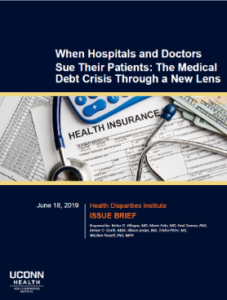 Medical debt is a burden that is both widespread and potentially devastating. A 2018 survey found that 43 percent of adults had problems with medical bills or medical debt, and other research has found that black adults are particularly likely to struggle with medical debt.
Medical debt is a burden that is both widespread and potentially devastating. A 2018 survey found that 43 percent of adults had problems with medical bills or medical debt, and other research has found that black adults are particularly likely to struggle with medical debt.
Now researchers at the UConn Health Disparities Institute are looking at the issue from a different angle: What happens to the doctor-patient relationship when doctors or hospitals sue their patients over unpaid bills?
“It would seem logical that a lawsuit against a patient would have adverse consequences on a patient’s trust. We could also hypothesize that physician agency, ‘I am your advocate,’ could also be eroded in the presence of medical debt and the experience of litigation,” the researchers wrote in an issue brief released this week. They are currently working on a large study to examine the issue.
The researchers examined lawsuits in Connecticut, finding that between 2011 and 2016, physician practices, hospitals, or collection agencies filed 81,136 lawsuits over medical debt in small claims court. These cases don’t include lawsuits seeking more than $5,000, but altogether, accounted for more than $110 million in medical debt. In 99 percent of the cases, the court disposition favored the plaintiffs. More than half the time, the patients did not attend the court hearing.
“Growing evidence suggests that medical debt is one of the most salient drivers of health disparities, decreased access to needed care and a leading contributor to growing economic insecurity,” the researchers wrote.
To read the full issue brief, click here.